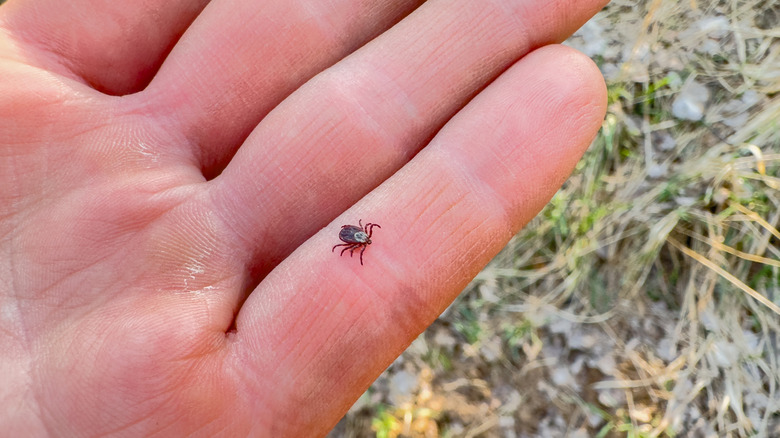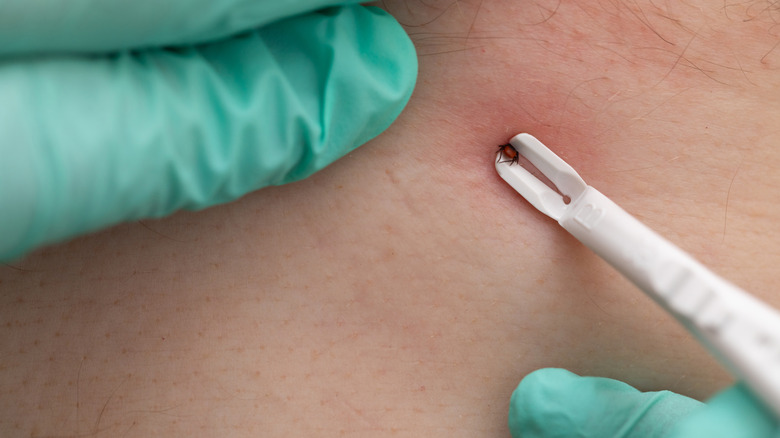Eliminate Ticks For Good With The Help Of One Medicine Cabinet Staple
Diseases contracted via ticks have been reported in all 50 states, and about 15 states consider ticks an endemic problem, namely northeastern regions like New York and Connecticut. At least 15 species of ticks appear just in the state of Illinois, hiding on the tips of grasses and shrubs before crawling upward several feet toward any host animal or person that brushes past. The bloodsuckers may fall off before checking for them, and people might not even recognize a small tick bite. This can be dangerous since they carry at least a dozen diseases, including Lyme disease. As climate change increases the range ticks can travel, know that you can take care of these pests with a household staple — rubbing alcohol.
Ticks should not simply be removed from the premises after being taken off. They can be a public health risk. For this same reason, you should never crush a tick with your fingers because it could still pierce the skin or spread disease through its bodily fluid. You should dispose of a tick by flushing it down the toilet or submerging it in alcohol. In fact, 70% isopropyl (rubbing) alcohol, 95% ethanol (found in beverages and fuel), as well as acetone (often used in nail polish remover) are all shown to kill ticks within minutes. Keep rubbing alcohol on-hand as one way of being prepared to deal with ticks in your yard and home.
How to remove a tick
Rubbing alcohol can help you deal with many different pests. However, drowning ticks in rubbing alcohol is the last step; first you need to know how to remove a tick. As mentioned, there are various ticks. The blacklegged deer tick is a common source of Lyme disease, whereas the lone star tick transmits diseases like alpha-gel syndrome (which gives sufferers a red meat allergy). You are more likely to encounter "hard" ticks with a shield behind their mouthpiece, as "soft" ticks prefer birds and flying prey. This is where you may have heard about a tick's mouthpart breaking off.
Even with this possibility, pulling out a tick with tweezers and dropping it into rubbing alcohol is the most effective method. Use fine-tipped tweezers and grab the tick close to your skin. Take a deep breath and pull upward with steady, even pressure. It may help to pull with one side of the tweezers against your skin to reduce pinching, but you do not want to jerk the tick around and risk breaking off its head. After that, thoroughly clean the bitten area with rubbing alcohol, soap, and water. If you find part of its body has broken off in your skin, don't worry; leftover parts will be naturally expelled like a splinter. Never attempt to burn the tick off with something like a match, nor should you try to suffocate it in nail polish or petroleum jelly. This could cause the tick to become slippery, or in the worst case, it may regurgitate into the bite wound and cause an infection.
How to avoid ticks before it's time to break out the rubbing alcohol
Of course, the best-case scenario is that you never encounter a tick and risk contracting diseases like Lyme in the first place, thus avoiding the use of rubbing alcohol. That is easier said than done given ticks are most active during springtime, when you are more likely to be outside. There are a number of plants you can grow to keep ticks out of your yard, including lemongrass and rosemary, but this can only go so far if you want to enjoy hikes in wooded or grassy areas with lots of vegetation for them to hide in.
One tip for dealing with ticks is to wear long-sleeved, light-colored, and tight-woven clothing so they are visible and have less space to latch onto your skin. Tuck your pant legs into your socks and wear a hat if possible. Insect repellents with concentrations of 20% or more DEET, picaridin, or oil of lemon eucalyptus are shown to be most effective with ticks. Once you are indoors, check yourself and your pets thoroughly for signs of ticks. Showering within two hours of coming home is shown to reduce the risk of Lyme disease. If you find and kill ticks with rubbing alcohol, make sure to dispose of them in a sealed container. Consult a doctor soon after contracting a bite, as there are currently no vaccines for tickborne illnesses.


